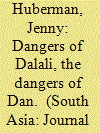| Srl | Item |
| 1 |
ID:
100035


|
|
|
|
|
| Publication |
2010.
|
| Summary/Abstract |
The moral perils believed to be associated with the giving and receiving of dan (giving) have been widely noted by anthropologists of South Asia. However, among these studies of Indian giving and exchange, less attention has been devoted to exploring how and why commercial transactions become a site of moral condemnation. Drawing upon twenty months of fieldwork with the boys who operated as commission agents or dalals in the foreign tourist economy in the city of Banaras, I demonstrate how the youths regarded these earnings as morally problematic. I argue that the various condemnations of dalali (commission) were symptomatic of a set of deeper concerns regarding the impact of foreign tourism, the future of the boys and their families, and ultimately the (re)production of the socio-cultural order itself. Furthermore, I argue that narratives about the dangers of dalali took on significance because they intersected with more pervasive, highly ambivalent reactions to modernity in India. As such, the conceptions of the dangers of dalali and danprovided people with a concrete way to address social changes that seemed at once overwhelming yet inchoate.
|
|
|
|
|
|
|
|
|
|
|
|
|
|
|
|
| 2 |
ID:
001537


|
|
|
|
|
| Publication |
DelhI, Oxford University Press, 1999.
|
| Description |
xx,490p.
|
| Standard Number |
9780195648560
|
|
|
|
|
|
|
|
|
|
|
|
Copies: C:1/I:0,R:0,Q:0
Circulation
| Accession# | Call# | Current Location | Status | Policy | Location |
| 041102 | 294.5/DAL 041102 | Main | On Shelf | General | |
|
|
|
|
| 3 |
ID:
184159


|
|
|
|
|
| Summary/Abstract |
Centred on the ‘devotion to the ineffable divine’ (nirguṇ bhakti), the sectarian community known as the Dādū Panth (lit. ‘Dādū's path) had a class of sant-intellectuals who conceived their tradition on high literary and philosophical grounds. Succeeding on the local level, but aspiring to imperial ties, the intellectuals of the Dādū Panth not only built their community identity in relation to the Mughal-Rajput imperial milieu but also to the overlapping ideals of emerging sulh-i kull (universal peace) and Vedānta paradigms. Such expertise on the part of the Dādū Panthīs made their ties with the Marwar royal polity strong and long-lasting, as demonstrated in their hagiographical accounts which are corroborated by land grants by the kingdom. Later in the eighteenth and nineteenth centuries, when the imperial order was waning, the Dādū Panthīs expanded their networks in the Rajput courts of not only Rajasthan, but also Gujarat and Madhya Pradesh. The sants of the bhakti movement(s) are normally thought to have had a lower-caste base—and thus a subaltern voice—but the example of the Dādū Panth presented in this article demonstrates that sants’ social base was broad and that the interrelation of sant-bhakti with the courtly order was strong; sant-bhakti therefore needs to be rethought in the study of bhakti traditions.
|
|
|
|
|
|
|
|
|
|
|
|
|
|
|
|